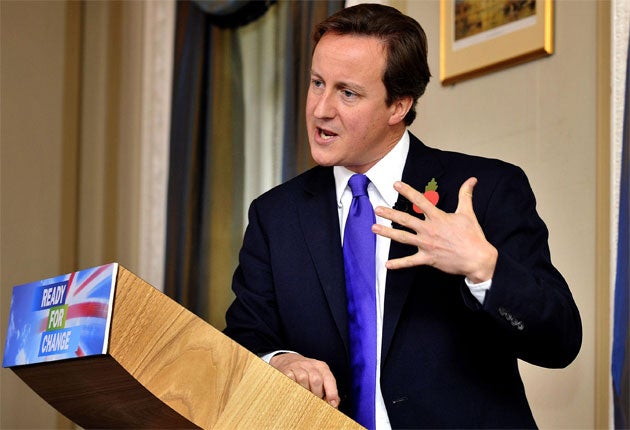Cameron pledges end to poverty trap for jobless
Tory leader blames the benefits system for keeping people out of work

Some of Britain's unemployed are worse off when they accept a job, David Cameron claimed yesterday as he promised to simplify the country's benefits system and put an end to the "poverty trap".
Welfare reform was a central theme of the Tory leader's conference speech earlier this month, during which he said that some single mothers who choose to work would lose 96p in every pound they earned as a result of tax and the loss of benefits. But he went even further yesterday after new data suggested that some people would actually lose money by moving off benefits and into work. Using research by the Office of National Statistics, Mr Cameron said that an unemployed couple with no children would be £9.27 a week worse off if one of them decided to take a part-time job, while an unemployed couple with three children also faced losing out by accepting low-skilled work once travel costs were included.
"What sort of crazy signal does this send out?" Mr Cameron asked. "Don't strive for independence, don't try to provide for your family, don't try to do the responsible thing."
George Osborne, the shadow Chancellor, will now draw up plans to reform the system along with Theresa May, the shadow Pensions Secretary, and Iain Duncan Smith, the party's former leader, who now advises on welfare reform.
The number of people receiving benefits has been stubbornly stuck around 5.4 million for the last decade. Around 2.1 million people currently receive income support, more than one million are on jobseeker's allowance, and 2.6 million receive incapacity benefit.
The move signals that Mr Cameron has dismissed radical recommendations already made by Mr Duncan Smith as unaffordable. His Centre for Social Justice (CSJ) had called for some vulnerable groups to be allowed to hold on to some benefits once in work, which would have cost an extra £2.7bn a year in the short term. "It would be wrong to commit yourself without full consideration of something that could cost a lot of money," Mr Cameron said.
The Government immediately accused Mr Cameron of spin, arguing that the statistics he had cited only referred to "potential scenarios" rather than real households. A spokeswoman for the Department for Work and Pensions also said that the number of people who would not benefit financially from finding work was effectively zero, down from 5,000 families in 1998.
Mr Cameron also revealed that his shadow Cabinet would begin to publish details of their priorities once in Government in a bid to counter claims that his party is light on policy. In an echo of New Labour's 1997 billboard campaign that set out five "pledges" to voters, shadow ministers have been told to begin unveiling their priorities for their departments from next week.
"We want to give people confidence that we can, in government, make change happen," he said. "I don't think ministers can accomplish much unless they have an incredibly clear idea about what they want to achieve and how they will go about it. Ministers can't deal with everything at once and they shouldn't try to. Instead they should prioritise what really matters and reforms that will make the biggest difference and be single-minded about achieving them."
96
Number of pence in the pound the Tories claim some single mothers lose by taking a job.
Join our commenting forum
Join thought-provoking conversations, follow other Independent readers and see their replies
Comments
Bookmark popover
Removed from bookmarks